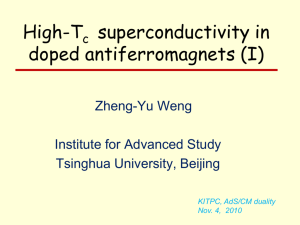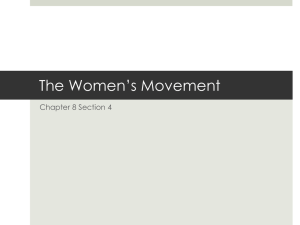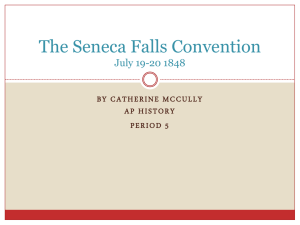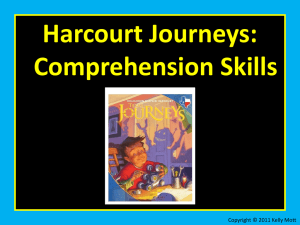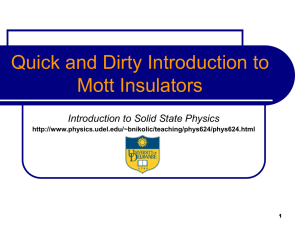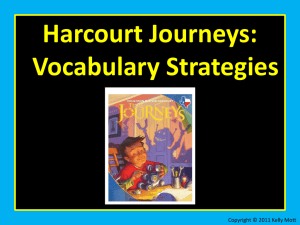*** 1 - Isaac Newton Institute for Mathematical Sciences
advertisement
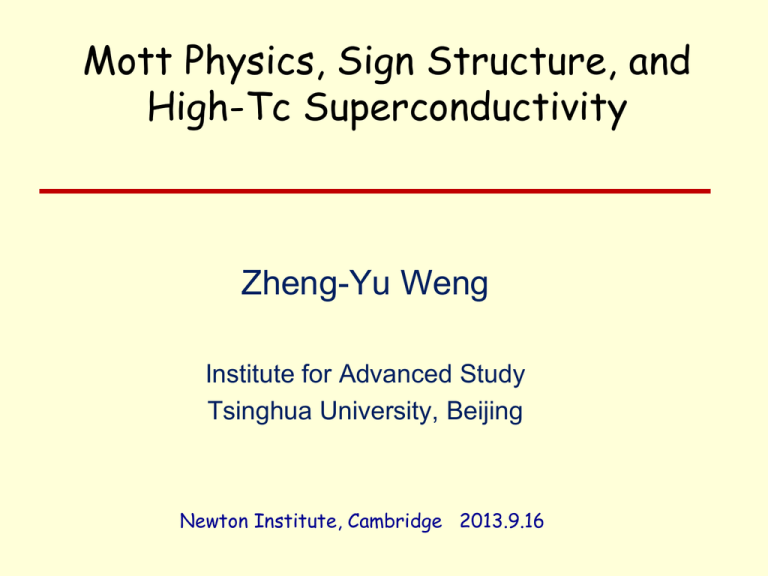
Mott Physics, Sign Structure, and High-Tc Superconductivity Zheng-Yu Weng Institute for Advanced Study Tsinghua University, Beijing Newton Institute, Cambridge 2013.9.16 Outline • Introduction to basic experimental phenomenology of high-Tc cuprates • High-Tc cuprates as doped Mott insulators /doped antiferromagnets • Basic principles: Mott physics and sign structure • Nontrivial examples: (1) one-hole case (2) finite doping and global phase diagram (3) ground state wavefunction • Summary and conclusion Discovery of high-Tc superconductors Mueller Bednorz 1986 Landau paradigm F ARPES k , Zk Fermi sea Fermi surface of copper Fermi degenerate temperature TF EF / kB EF ~ 1eV 10,000K T TF typical Fermi liquid behavior: Cv T Sommerfeld constant s const. Pauli susceptibility 1 / T1 T Korringa behavior La2-xSrxCuO4 Specific heat Spin susceptibility (T. Nakano, et al. (1994)) (Loram et al. 2001) Fermi liquid behavior: NMR spin-lattice relaxation rate Cv T Sommerfeld constant s const. Pauli susceptibility 1 / T1 T Korringa behavior (T. Imai et al. (1993)) Uniform spin susceptibility Fermi liquid Heisenberg model F no indication of Pauli susc. J T. Nakano, et al. PRB49, 16000(1994) uniform susceptibility, resistivity NMR 1/T1 Optical measurement Photoemission Nernst effect Underdoped phase diagram T ~ J/kB Pseudogap: T0 New quantum state of matter? strong AF correlations A non-Fermi-liquid Tc T0 strange metal: maximal scattering TN T* Tv lower pseudogap phase strong SC fluctuations Tc 0 antiferromagnetic order FL QCP d-wave superconducting order x Outline • Introduction to basic experimental phenomenology of high-Tc cuprates • High-Tc cuprates as doped Mott insulators /doped antiferromagnets • Basic principles: Mott physics and sign structure • Nontrivial examples: (1) one-hole case (2) finite doping and global phase diagram (3) ground state wavefunction • Summary and conclusion Cuprates = doped Mott Insulator Anderson, Science 1987 T ~ J/kB one-band large-U Hubbard model: T0 TN T* Tv Half-filling: Mott insulator Tc x=0 QCP x Mott Insulator/ antiferromagnet F Mott insulator doped Mott insulator F F F Heisenberg model t-J model A minimal model for doped Mott insulators: t-J model hopping superexchange cc 1 i i Half-filling: Low-energy physics is described by Heisenberg model Pure CuO2 plane H=J å Si · S j <ij> large J = 135 meV quantum spin S =1/2 charge localization at low doping ARPES result: A broad peak at x=0 Ando et al, PRL 87, 017001 (2001) K. M. Shen et al, PRL 93, 267002 (2004) Doping the Mott Insulator/ antiferromagnet La-Sr-Cu-O La-Bi2201 Peng, et al., arXiv:1302.3017 (2013) Sebastian, et al., Reports on progress in physics 75, 102501 (2012) Doping the Mott Insulator/ antiferromagnet La-Sr-Cu-O charge localization La-Bi2201 Peng, et al., arXiv:1302.3017 (2013) Sebastian, et al., Reports on progress in physics 75, 102501 (2012) Questions • If charge localization is intrinsic in a doped Mott insulator with AFLRO? • If charge delocalization (superconductivity) arises by destroying the AFLRO? • Is localization-delocalization the underlying driving force or the T=0 phase diagram of the underdoped cuprates? Outline • Introduction to basic experimental phenomenology of highTc cuprates and high-Tc cuprates as doped Mott insulators /doped antiferromagnets • Basic principles: Mott physics and sign structure • Nontrivial examples: (1) one-hole case (2) finite doping and global phase diagram (3) ground state wavefunction • Summary and conclusion Statistical sign structure for Fermion systems Fermion signs y (x1, x2,...) = -y (x2, x1,...) Landau Fermi Liquid ( ) å (-1) Z FG º Tr e- b H = loop c N ex (c) W(c) , W(c) ³ 0 interacting fermions: fractal nodes F. Kruger and J. Zaanen, (2008) y (x1, x2,...) = -y (x2, x1,...) nodal hypersurface Pauli hypersurface Nodal hypersurface d=2 Test particle (1) Fermi liquid: Fermion signs Z FG = N ex (c) (-1) W (c) W(c) ³ 0 å loop c (2) Off Diagonal Long Rang Order (ODLRO): compensating the Fermion signs Bose condensation y (x1, x2,...) = +y (x2, x1,...) Cooper pairing in SC state CDW (“exciton” condensation) SDW (weak coupling) normal state: Fermi liquid Antiferromagnetic order (strong coupling) Z Heisenberg = å W (c) loop c (b J / 2)n W (c) = å d M-¯ +MQ ,n ³ 0 n! n Complete disappearance of Fermion signs! (3) Single-hole doped Heiserberg model: Z1-hole = å t W (c) c loop c t c º (+1) ´ (-1) ´ (-1) ´ ...... = ( -1) N h¯ (c) 2t 2t 2t (b J / 2)n W (c) = × ... å d M h +M-¯ ,n ³ 0 J J J n n! M h (C ) + - Phase string effect D.N. Sheng, Y.C. Chen, ZYW, PRL (1996) (4) Exact sign structure of the t-J model at arbitrary doping, dimensions, temperature M h (C ) = total steps of hole hoppings M (C ) = total number of spin exchange processes M Q (C ) = total number of opposite spin encounters Wu, Weng, Zaanen, PRB (2008) For a given path c: + - - + - - + + - + + + + + - (-) + (-)3 + - + - - + K. Wu, ZYW, J. Zaanen, PRB (2008) Emergent gauge force in doped Mott insulators! Z= å t W (c) c W(c) ³ 0 loop c (+1) ´ (-1) ´ (-1) ´...... º t c Mutual Chern-Simons gauge theory Kou, Qi, ZYW PRB (2005); ZYW et al (1997) (1998) Ye, Tian, Qi, ZYW, PRL (2011); Nucl. Phys. B (2012) Nonintegrable phase factor: B Pe e i Am dx m c ò A “An intrinsic and complete description of electromagnetism” A “Gauge symmetry dictates the form of the fundamental forces in nature” C. N. Yang (1974) , Wu and Yang (1975) B “smooth” paths good for mean-field treatment singular quantum phase interference New guiding principles: • Mott physics = phase string sign structure replacing the Fermion signs • Strong correlations = charge and spin are long-range entangled • Sign structure + restricted Hilbert space = unique fractionalization Outline • Introduction to basic experimental phenomenology of highTc cuprates and high-Tc cuprates as doped Mott insulators /doped antiferromagnets • Basic principles: Sign structure and Mott physics • Nontrivial examples: (1) one-hole case (2) finite doping and global phase diagram (3) ground state wavefunction • Summary and conclusion DMRG numerical study Z. Zhu, H-C Jiang, Y. Qi, C.S. Tian, ZYW, Scientific Report 3, 2586 (2013) t-J ladder systems Effect of phase string effect no phase string effect t^ = 0 Self-localization of the hole! σ Removing the phase string: A sign-free model σ Z= å t W (c) c loop c tc º1 no phase string effect! 2t 2t 2t (b J / 2)n W (c) = × ... å d M h +M-¯ ,n ³ 0 J J J n n! M h (C ) Momentum distribution Quasiparticle picture restored! without phase string effect localization-delocalization transition t’ t Theoretical understading of self-localization of the one-hole in 2D -+ + - - - + - + + + + - destructive quantum phase interference leads to self-localization D.N. Sheng, et al. PRL (1996); Holon localization at low doping: ZYW, et al. PRB (2001) S.P. Kou, ZYW, PRL (2003) T.-P. Choy and Philip Phillips, PRL (2005) P. Ye and Q.R. Wang, Nucl. Phys. B (2013) Outline • Introduction to basic experimental phenomenology of highTc cuprates and high-Tc cuprates as doped Mott insulators /doped antiferromagnets • Basic principles: Sign structure and Mott physics • Nontrivial examples: (1) one-hole case (2) finite doping and global phase diagram (3) ground state wavefunction • Summary and conclusion Example II: Delocalization and superconductivity -+ + - -+ + - - - - + + - + - + + localization/AFLRO AF - + + + + - - delocalization/SC spin liquid/RVB! spin liquid doping localization SC Non-BCS elementary excitation in SC state -+ + - -+ + - - + - + + + - - + + - + - - spin-roton -+ + Superconducting transition - + - spinon confinement-deconfinement transition + + spinon-vortex - Global phase diagram T charge-spin long-range entanglement by phase string effect “strange metal” T0 pseudogap AF SC FL δ localization AF = long-range RVB zl z jd h h hd | zlh z jd (l , l ,..., l | h 1 2 Nh ) Outline • Introduction to basic experimental phenomenology of highTc cuprates and high-Tc cuprates as doped Mott insulators /doped antiferromagnets • Basic principles: Sign structure and Mott physics • Nontrivial examples: (1) one-hole case (2) finite doping and global phase diagram (3) ground state wavefunction • Summary and conclusion Example III : “Parent” ground state ZYW, New J. Phys. (2011) zlh z jd h hd | zlh z jd (l , l ,..., l | h 1 2 Nh ) lh AFM state: h (l1, l2 ,..., lN ) constant h Superconducting state: emergent (ghost) spin liquid gij : BCS-like pairing short-ranged iu jd Summary and Conclusion • Cuprates are doped Mott insulators with strong Coulomb interaction • New organizing principles of Mott physics: An altered fermion sign structure due to large-U • Consequences: (1) Intrinsic charge localization in a lightly doped antiferromagnet (2) Charge delocalization (superconductivity) arises by destroying the AFLRO (3) Localization-delocalization is the underlying driving force for the T=0 phase diagram of the underdoped cuprates • Non-BCS-like ground state wavefunction Fermionic RVB theories P. W. Anderson: Resonating valence bond (RVB) theory (1987) Slave-boson mean-field theory: Baskaran, Zou, Anderson (1988) Kotliar, Liu (1988) … Gauge theory description: U(1) P.A. Lee, N. Nagaosa, A. Larkin, … SU(2) X.G. Wen, P. A. Lee, … Z2 Sentil, Fisher …….. Variational wave function: Gros, Anderson, Lee, Randeria, Rice, Trivedi, Zhang; T.K. Lee; Tao Li, … Anderson, et al., J. Phys.: Condens. Mater (2004) Lee, Nagaosa, Wen, RMP (2006) (5) Hubbard model on bipartite lattices: A general sign structure (Long Zhang & ZYW, 2013 ) Hilbert space: spinons holon (h) doublon (d) Basic hopping processes in the Hubbard model Partition function: Z= å t W (c) t W(c) ³ 0 c U loop c t c = ( -1) N h¯ (c)+N d¯ (c) ( -1) J h d N ex (c)+Nex (c) + + - + + half-filling: t c Þ1 U / t ® ¥ tc Þ + + - Fermi signs U/t®0 (-) intermediate U / t t c Þ phase string effect - + Spin-charge separation three-leg ladder:
